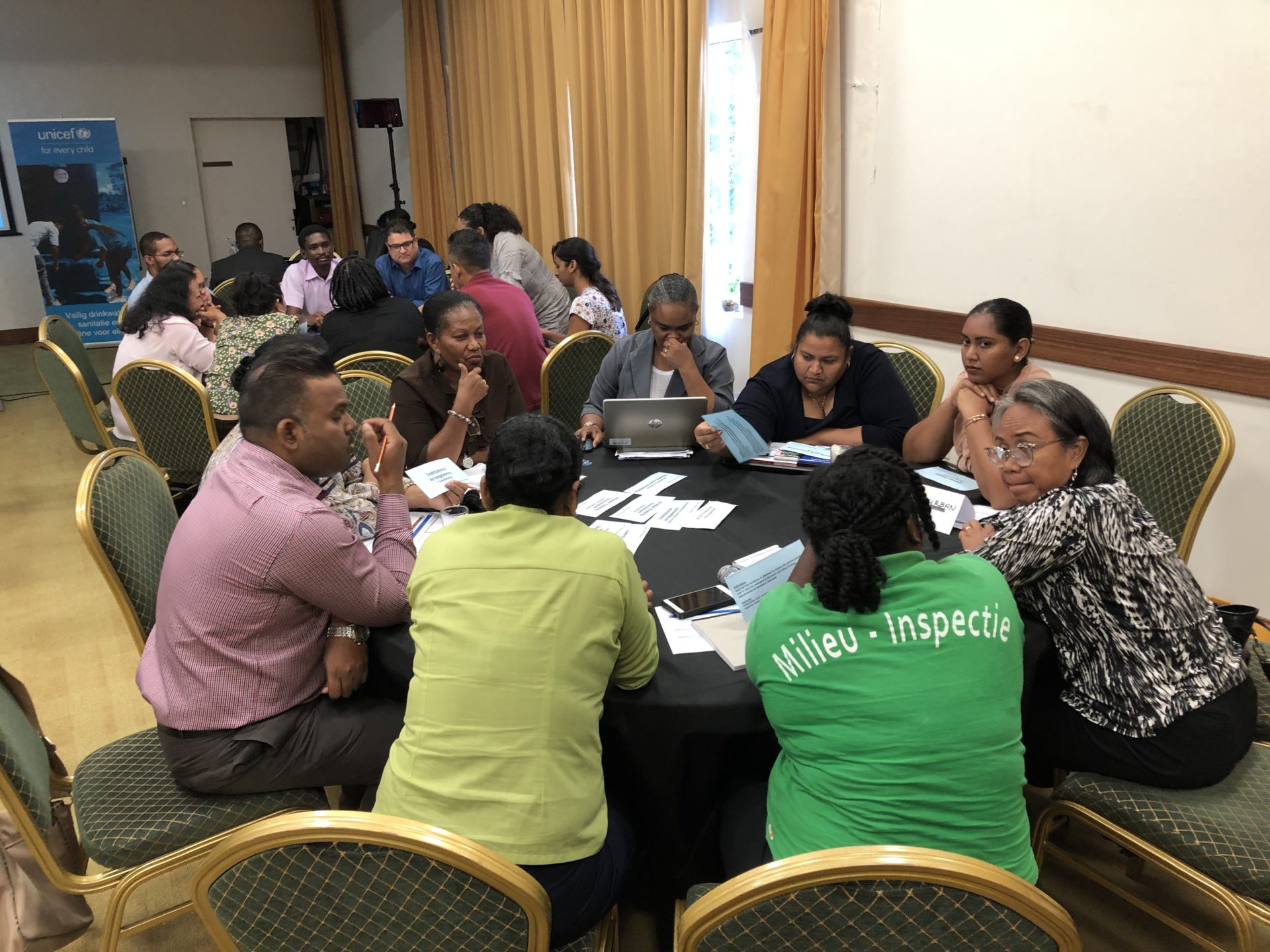- SIWI – Leading expert in water governance
- /
- Latest
- /
- WASH Bottleneck Analysis (WASH BAT) in Suriname raise the need to develop legislative framework that takes into consideration the rights of indigenous peoples.
WASH Bottleneck Analysis (WASH BAT) in Suriname raise the need to develop legislative framework that takes into consideration the rights of indigenous peoples.

WASH BAT implemented in Suriname with the support of WGF during a three-day multi-stakeholder workshop in October 2019, identified several governance functions such as policy and strategy, monitoring and evaluation, financing, capacity development, accountability, and regulation, in order to improve coverage and quality.
The key objectives were to bring key WASH stakeholders together to discuss sector opportunities and challenges; identifying bottlenecks, developing action points on how best to remove them, assigning responsibilities, and establishing timeframes to address the bottlenecks that arose during the workshop exercises.
Suriname is a small country with a population of around 600,000, located on the north-eastern tip of South America. It has strong links to the Caribbean and to the Netherlands due to its colonial past, with Dutch being the official language, together with eight other recognized regional languages.
Suriname is an upper-middle income country but has seen a recent reversal of economic growth. Of the total population, 10 per cent live in the interior of the country, mainly Maroons (comprising approximately 80 per cent) and Indigenous making up a further four per cent. The economy is mainly concentrated around extractive industries, that include gold and oil. A reliance on natural resource revenues has exposed the country to commodity price fluctuations. Extractive industries, mainly illegal gold mining, is causing arsenic and cyanide poisoning of land, rivers, and lakes, which is often the main source of water and sanitation for many living in the interior of the country. A study by Ouboter et al in 2018 found that levels of mercury in the bloodstreams of tested participants from Surinamese villages, even those living well upstream away from mining activities, exceeded safety thresholds.
Suriname carried out the Multiple Indicator Cluster Survey (MICS) back in 2018. This provided an important overview of the WASH situation in the country, including those areas which need more attention if the country is to reach SDG 6, ensuring availability and sustainable management of water and sanitation for all. At national level the country is performing well in terms of drinking water, with 98 per cent of the population having access to basic drinking water. Those living in the rural interior area of the country has the lowest access to basic drinking water (91 per cent), with the rest using surface water which is likely to be polluted.
Nine in ten households in the country (89 per cent) make use of improved sanitation facilities which are not shared with other households, but there is a high inequality by area: 94 per cent of Urban households have access to improved facilities compared with only 47 per cent for those living in the rural interior. Furthermore, 22 per cent of those living in the rural interior has no sanitation facilities at all. While the open defecation rates nationally are low (2 per cent) there are big differences per region, with the rural interior having rates of 22 per cent. One in ten of those in the poorest quintile have no facility, and 14 per cent of those living in a household with no or only primary education defecate in the open. indigenous peoples mainly living in the Amazon rainforest, have historically been excluded from public services, including safely managed sanitation, forcing many to defecate in the open, endangering their health and polluting their environment and water. Many of the indigenous groups live in impenetrable jungle, where there are no roads, making it very difficult to transport hardware and carry out sensitization campaigns.
Furthermore, when dealing with indigenous groups, policy often fail to consider their belief systems. In 2016, the Inter-American Court of Human Rights delivered its verdict on the case brought forward by the Kali’na and Lokono peoples against Suriname and the UN Declaration on the Rights of Indigenous Peoples. The court ruled that Suriname violated the rights of the indigenous groups to continue their traditional way of life, and that their distinct cultural identity, social structure, economic system, customs, beliefs and traditions must be respected, guaranteed and protected. When it comes to sanitation, this means respecting their human right to safely managed sanitation while respecting their cultural beliefs which may influence how this service can be guaranteed.
The workshop brought together senior stakeholders from the relevant government ministries, service providers, the private sector, NGOs, and representatives of the indigenous groups, in order to identify the main bottlenecks impeding progress. Over three days the stakeholders came up with activities to remove the bottlenecks and agreed on an action plan to take the first steps towards implementing the activities.
During the workshop bottlenecks were identified, with the key areas needed in order to improve coverage and quality identified as policy and strategy, monitoring and evaluation, financing, capacity development, accountability, and regulation.
From the conclusions of the workshop exercises, activities were proposed to solve these bottlenecks, with prioritization of the most critical activities together with the development of a costed action plan. Some of the key activities included the definition of a 2030 Vision for Water and Sanitation for Suriname, which can provide a long-term horizon for planning and priorities for all future governments; and to develop legislative framework that takes into consideration the rights of indigenous peoples.
The formation of a water working group would be the institution to take the most important issues forward, with key members of WASHBAT as participants, being able to continue their work after the conclusion of the workshop. Additional meetings will be needed to harmonize the action plan across sub-sectors, finalizing budget requirements and allocate responsibilities.
More information can be found here: http://www.washbat.org
Most recent

SIWI Amman and UNICEF host Libya representatives for WASH exposure visit
- Water, Sanitation and Hygiene (WASH)
- Water governance

Water and land: Partners in climate mitigation
- Water in landscapes
- Wetlands
- Water governance

What is the role of water in rural and urban school facilities?
- Water, Sanitation and Hygiene (WASH)
- Water in landscapes
- Water governance
- Gender and water

Taking root: locally driven forest landscape restoration
- Water in landscapes
- Wetlands
- Groundwater
- Resilience through water

SIWI Amman hosts Ghana representatives for WASH exposure visit in Jordan

In loving memory of Kasonde Mulenga

Join us on a journey through 2023

